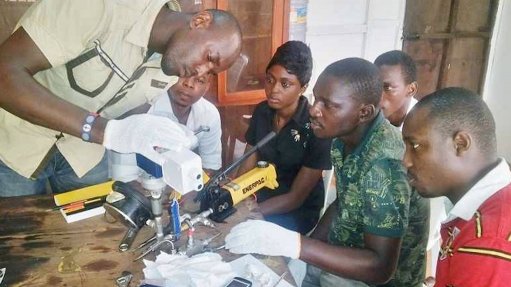
PRACTICAL EXPERIENCE The SAIMC is engaging with South African universities to ensure that students are being taught the required practical skills sets
There is no specific qualification for instrumentation and control (I&C) in South Africa at the Bachelor of Science level and, as a result, there is insufficient scope for specialisation, which contributes to the existing shortage of skills, says South African measurement and control industry development promotion body SAIMC president Vinesh Maharaj.
“People who qualify as electrical, process or chemical engineers, but who want to specialise in I&C, require a further three-year training programme to qualify as competent I&C engineers.
“As a result, these employees become an additional overhead to the businesses they work for because there is no commensurate return on investment during training,” he explains.
Maharaj points out that, owing to the current challenging economic climate, many companies cannot afford to invest in training the students for three years and are reducing the number of graduates they accept.
He adds that even those companies that are investing in training graduates face the challenge of retaining them, as they are often poached by competitors who do not invest in training and, therefore, can afford to offer better packages.
However, the society is engaging with several South African universities to ensure that when students graduate, they are equipped with not only theoretical knowledge but also practical skills in automation and I&C.
SAIMC is also a member of a committee that was established by the Department of Higher Education and Training in March this year to advise government on skills investment to ensure that the R4-trillion Strategic Integrated Projects are developed within an efficient strategic framework.
“We have been working for the past five months on a proposal for higher education institutions on how they can provide improved support for the teaching and training of automation and I&C. We are part of a team that will submit a detailed report to the Presidential Infrastructure Coordinating Commission in the next two to three weeks containing our proposals,” says Maharaj.
Some of the proposals include that government subsidise companies that take in new graduates that are specialising in I&C to alleviate the financial pressure on companies and that retired professional engineers be paid to mentor new graduates to ensure that important skills sets are not lost.
He points out that the SAIMC has a list of volunteers who mentor new graduates and the council provides mentors for member companies. These mentorship programmes are currently limited to those individuals who want to register as professional engineers with the Engineering Council of South Africa.
Maharaj says the programmes are limited because the SAIMC is constrained by funding challenges, as the society is a voluntary organisation that does not receive any government funding and depends only on membership fees to fund its activities.
However, he points out that the society has many retired mentors available who can provide “invaluable support” for new graduates if government could provide sufficient funding.